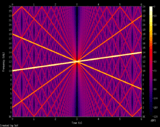SoX
| Developer(s) | Chris Bagwell, et al. |
|---|---|
| Stable release | 14.4.2 / 22 February 2015 |
| Written in | C |
| Operating system | Cross-platform |
| Type | Digital audio editor |
| License | GNU General Public License |
| Website |
sox |
Sound eXchange, abbreviated SoX, is a free cross-platform digital audio editor, licensed under the GNU General Public License (libsox is licensed under the GNU Lesser General Public License), and distributed by Chris Bagwell through SourceForge.net. SoX is written in standard C, and has a command-line interface.
History
SoX was created in July 1991 by Lance Norskog and posted to the Usenet group alt.sources as Aural eXchange: Sound sample translator. With the second release (in November the same year) it was renamed Sound Exchange. Norskog continued to maintain and release SoX via Usenet, FTP, and then the web until early 1995, at which time SoX was at version 11 (gamma). In May 1996, Chris Bagwell started to maintain and release updated versions of SoX, starting with version sox-11gamma-cb. In September 2000, Bagwell registered the project at SourceForge with project name "sox". The registration was announced on the 4 September 2000 and SoX 12.17 was released on 7 September 2000.
Throughout its history SoX has had many contributing authors; Guido van Rossum, best known as creator of the Python programming language, was a significant contributor in SoX's early days.
Features

Some of SoX's features are:
- Cross-platform (Windows, Linux, Solaris, Mac OS X, et al.)
- Reading and writing AU, WAV, AIFF, MP3 (via an external LAME MP3 encoder), Ogg Vorbis, FLAC and other audio file formats
- Recording and playing audio (on many systems); playing via URL (internet file or stream)
- Editing via concatenate, trim, pad, repeat, reverse, volume, fade, splice, normalise
- Processing via chorus, flanger, echo, phaser, compressor, delay, filter (high-pass, low-pass, shelving, etc.)
- Adjustment of speed (pitch and tempo), pitch (without tempo), tempo (without pitch), and sample-rate
- Noise removal using frequency profiling, implemented since December 2004
- Silent passage removal, implemented since September 2001
- Simple audio synthesis
- Multi-file & multi-track mixing
- Multi-file merging (e.g. 2 mono to 1 stereo)
- Statistical analysis; spectrogram analysis
Examples
SoX being used to process some audio:
$ sox track1.wav track1-processed.flac remix - norm -3
highpass 22 gain -3 rate 48k norm -3 dither
Input File : 'track1.wav'
Channels : 2
Sample Rate : 44100
Precision : 16-bit
Duration : 00:02:54.97 = 7716324 samples = 13123 CDDA sectors
Sample Encoding: 16-bit Signed Integer PCM
Endian Type : little
Output File : 'track1-processed.flac'
Channels : 1
Sample Rate : 48000
Precision : 16-bit
Duration : 00:02:54.97 = 8398720 samples ~ 13123 CDDA sectors
Sample Encoding: 16-bit FLAC
sox: effects chain: input 44100Hz 2 channels 16 bits (multi)
sox: effects chain: remix 44100Hz 2 channels 16 bits (multi)
sox: effects chain: norm 44100Hz 1 channels 16 bits
sox: effects chain: highpass 44100Hz 1 channels 16 bits
sox: effects chain: gain 44100Hz 1 channels 16 bits (multi)
sox: effects chain: rate 44100Hz 1 channels 16 bits
sox: effects chain: norm 48000Hz 1 channels 16 bits
sox: effects chain: dither 48000Hz 1 channels 16 bits (multi)
sox: effects chain: output 48000Hz 1 channels 16 bits (multi)
Playing some audio files:
$ play *.ogg
01 - Summer's Cauldron.ogg:
Encoding: Vorbis
Channels: 2 @ 16-bit Track: 01 of 15
Samplerate: 44100Hz Album: Skylarking
Album gain: -7.8dB Artist: XTC
Duration: 00:03:19.99 Title: Summer's Cauldron
In:20.8% 00:00:41.61 [00:02:38.38] Out:1.84M [ ====|==== ] Clip:0
See also
- Digital audio
- Audio file format
- Audio effect
- Multitrack recording
- Audio mastering
- Sample rate conversion
- Free audio software
- List of Linux audio software
External links
- Official website
- Linux Journal article on SoX
- Stereo to Dolby Digital 5.1 Surround Sound – converting stereo to 5.1 channels Dolby Digital Surround Sound.